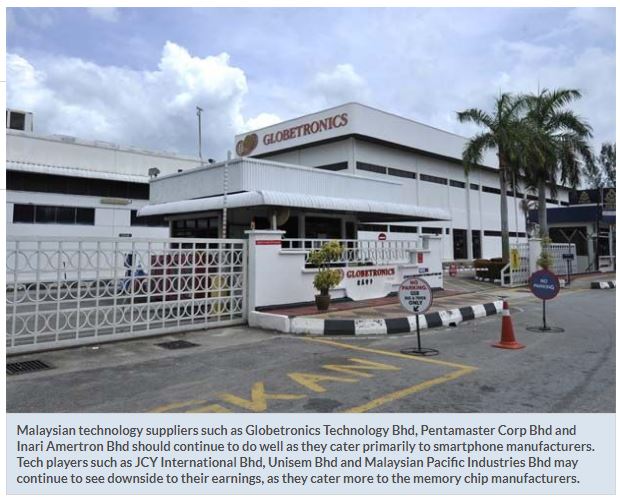Rebound seen in smartphone sales; boost for some M’sian tech firms
PETALING JAYA: Apple Inc and Samsung Electronics Co Ltd have posted results that are above and in line with street guidance, with investors now turning more bullish despite lower smartphone sales and slowing memory chip demand.
Both Apple and Samsung are expecting a rebound in sales in the second half of the year on the back of stabilising smartphone sales and a diversification into services and wearables.In the case of Apple, this is a better outlook for one of the world’s most expensive companies and leading smartphone manufacturers and distributors.
As such, Malaysian technology suppliers such as Globetronics Technology Bhd  , Pentamaster Corp Bhd
, Pentamaster Corp Bhd  and Inari Amertron Bhd
and Inari Amertron Bhd  should continue to do well as they cater primarily to smartphone manufacturers.
should continue to do well as they cater primarily to smartphone manufacturers.
Tech players such as JCY International Bhd  , Unisem Bhd and Malaysian Pacific Industries
, Unisem Bhd and Malaysian Pacific Industries  Bhd may continue to see downside to their earnings, as they cater more to the memory chip manufacturers.
Bhd may continue to see downside to their earnings, as they cater more to the memory chip manufacturers.
In the case of Apple, it delivered better-than-expected results for its fiscal 2019 second quarter ended March 30, 2019.
It was a complete turnabout from the shock waves it sent out in January when it issued a profit warning and bleak outlook due to falling iPhone sales. The share price went up as investors are happy with the outlook
Analysts were projecting Apple to make US$57.4bil in overall revenue (led by US$30.5bil in iPhone sales) and an earnings per share of US$2.37.
Well, iPhone sales are still slipping – the company made US$6 billion less or a 17% decline from the iPhone sales in the second quarter of 2019 than it had done in the same quarter last year. However, Apple still beat street expectations. iPhone sales came in at US$31bil.
On Tuesday, Apple said it had posted a quarterly revenue of US$58bil, a 5% decline from the year-ago quarter, and quarterly earnings per diluted share of US$2.46, down 10%.
The iPhone still accounts for 54% of Apple’s business, although that’s declining. Last year, the iPhone made up 61% of sales.
Meanwhile, Samsung posted its weakest profit in more than two years, due to its heavy dependence on memory chip sales over the last two years.
Mirroring Apple’s diversification into services and wearables, Samsung will be spending some US$115bil over the next ten years to diversify into the non-memory chip business.
Samsung posted an operating profit of 6.2 trillion won (US$5.4bil) in the quarter ended March, the smallest since late-2016 but in line with the company’s guidance.
Revenue fell 13.5% to 52.4 trillion won, also in line with its earlier estimates.
The results from Apple and Samsung are consistent with the forecast given to the supply chain, said Globetronics chief executive officer Datuk Heng Huck Lee.
“Our customers have adjusted their orders accordingly to the weaker outlook for the first half of 2019, which would impact our forecast for the period.
“However, the second half is projected to see a sharp recovery and our latest May order is showing strong confirmation,” Heng said.
According to Heng, Globetronics had been working hard to counter the risk of a smartphone slowdown last year.
Thus, in the second half of 2018, it made aggressive efforts to diversify into new opportunities and market segments with new customers.
“We committed a sizeable budget and additional resources to expand our revenue contribution beyond the smartphone market.
“So far, we are quite happy with the progress and we are confident that a couple of the new business units would commence mass production by the final quarter of 2019,” he said.
MMS Ventures Bhd  managing director T.K. Sia said the results of Apple and Samsung reflected the cyclical nature of the electronic and semiconductor industries.
managing director T.K. Sia said the results of Apple and Samsung reflected the cyclical nature of the electronic and semiconductor industries.
“The impact would be temporary,” Sia added.
“There would be demand for test equipment to check new products that are scheduled for release in the third quarter of 2019.
“We just have to be ready to make new test equipment when the orders come in,” he said.
Elsoft Research Bhd  chief executive officer C.E. Tan said the impact of the lower guidance would be applicable for the next three to six months.
chief executive officer C.E. Tan said the impact of the lower guidance would be applicable for the next three to six months.
“It is natural for customers to exercise caution on spending for test equipment used for checking smartphones and smart devices.
“For us, we execute the business plan and budget planned for this year, as we also have our orders from the automotive sector to fulfil.
“The technology for smartphones keeps on evolving and that would stimulate the demand for test equipment to check new lighting features and modules,” Tan added.
Elsoft makes test equipment to check the lighting features of smartphones and automobiles.
Apple’s improved outlook is primarily due to the recovery in China. This is due to reduced tension in the trade talks and the Chinese government taking action to stimulate the domestic economy, including a cut in the value-added tax rate.
Source: https://www.thestar.com.my/business/business-news/2019/05/02/rebound-seen-in-smartphone-sales/#gK0Y4HyYsMdF5Kq4.99


 Thailand
Thailand




